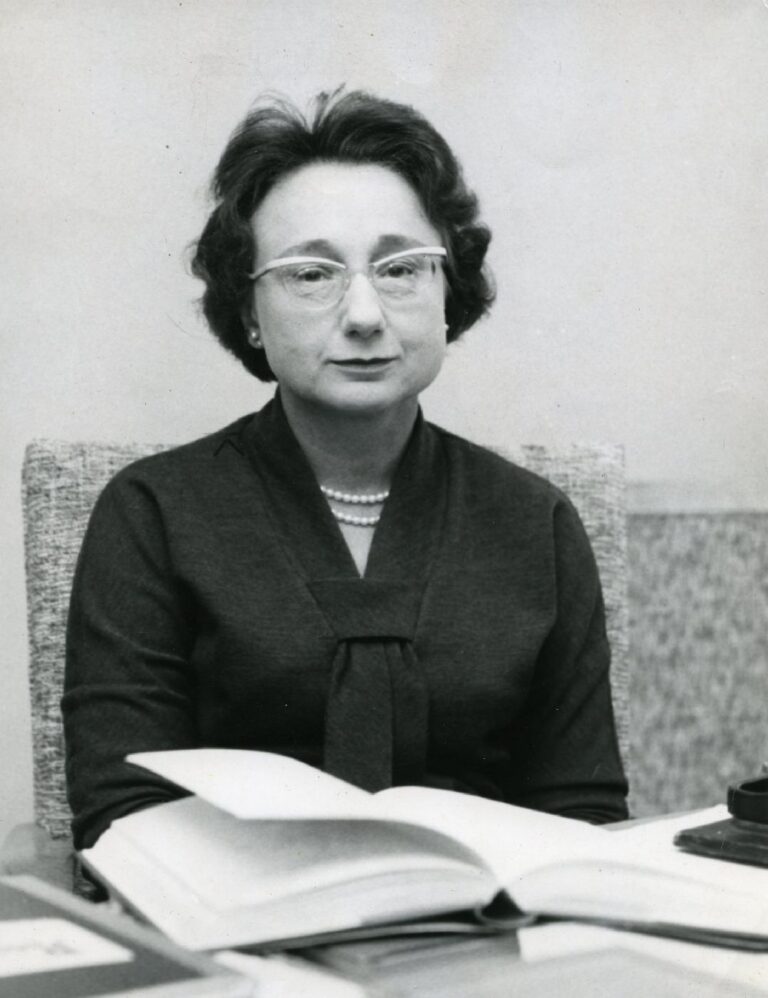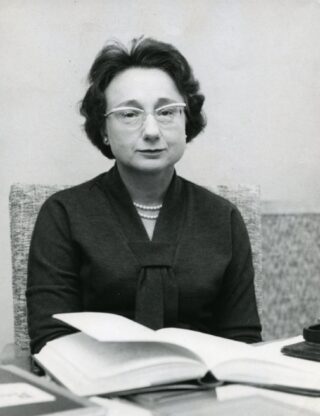- Entry type: Person
- Entry ID: AWE2520
Green, Dorothy
- AO, OAM
- Birth name Auchterlonie, Dorothy

- Born 28 May 1915, Sunderland, Durham, England
- Died 21 February 1991, Canberra, Australian Capital Territory, Australia
- Occupation Academic, Commonwealth or Empire Games Gold Medalist, Literary critic, Poet, Political activist, Swimmer
Summary
In the 1950s Dorothy Green wrote to a friend, ‘I am now rising forty two and looking back on my life, I find have spent the greater proportion of it doing things I didn’t want to do at all.’ Nearly thirty years later she felt ‘nothing has changed’. Yet during the course of her long life, Dorothy Green produced poetry, literary criticism and journalism and taught and shaped the lives of many students. With a Bachelor of Arts in English, French and Philosophy and an Master of Arts with Honours in English, she worked as a journalist in New South Wales and Queensland, was the principal of a girls’ private school, before moving in to tertiary education, holding positions at Monash University in Melbourne and the Australian National University and Australian Defence Forces Academy in Canberra. Married to Henry Green, journalist, librarian and literary historian, with whom she had two children, she was also politically active, especially later in her life, when she was a founding member of Writers Against Nuclear Arms and an ardent environmentalist. She wrote a study of the work of Henry Handel Richardson as well as updating her husband’s History of Australian Literature and publishing several books of poetry and numerous works of literary criticism.
Details
Literature is ‘the great conversation of mankind’, said Dorothy Green in an interview towards the end of her life. A small woman, immaculately dressed, Green presented an indomitable face to the world. Terminally ill with cancer, she began the interview with a quiet but forceful remark suggesting that the Australia Council should have commissioned the interview earlier, when she had been well. It is a stilted interview and Green comes across as serious and contemplative, happy to allow silences to extend rather than filling them up with chatter. She does not make jokes; instead the occasional acerbic remark pointing to what she perceives as one of life’s idiocies.
Dorothy Auchterlonie was born and spent the early years of her life in Sunderland, to which place she ascribed ‘the origins of British culture’. Her mother was born in Rockhampton in Queensland but had migrated back to family in the north of England after the early death of her own mother. Dorothy enjoyed what she called an ‘uninhibited’ childhood, with the freedom to explore her environment while her mother was ‘careful to provide books’ and sent her to a good school. Her father died of Spanish flu when she was five and after her mother’s remarriage they emigrated to Australia in 1928. ‘I thought we had come to hell’, she said of Far North Queensland , which was at the end of a three-year drought, and as always with an ear for the literary turn of phrase, she explained that it was ‘so different from the green and pleasant land’ she had left.
The family quickly moved south to Sydney, where Dorothy attended North Sydney Girls School and had ‘a splendid time’ with ‘highly dedicated staff’, who issued ‘ a silent appeal to girls to achieve excellence in as many fields as possible’. With the encouragement and assistance of the principal of the small girls’ private school at which she was teaching, she managed to get an assisted place at Sydney University, where she studied English, French and Philosophy during the evenings. Decades later she remembered it as an exhilarating experience, which ‘set [her] mind free’, lecturers such as John Anderson encouraging her to consider ideas ‘she had never considered before’. She said that she never departed from his rule of ‘free, open, disinterested discussion’.
Dorothy published poetry in the Sydney Morning Herald and was co-editor of the journal Hermes with R W Rutledge in 1938. She told the interviewer in 1990 that she suspected that she had been appointed to rein in Robert Rutledge and encourage a more literary bent to the journal, but instead she revelled in the ‘revolutionary discussion of issues’ that they published. In 1940 she was one of the first four authors published by Bessie Mitchell with her fledgling Viking Press. Kaleidoscope was a poem about Sydney, in which she described the Sydney Harbour Bridge as a ‘steel excrescence’ and used a children’s nursery rhyme to make her point:
Twinkle, twinkle little stars
On a million motor-cars,
Along the Harbour bridge so high,
Like a coat-hanger in the sky.
Nevertheless she told the interviewer that she was ‘a very invisible poet’, and was ‘not very fond’ of talking about her writing process, save that it ‘comes out of my fingers’.
Working for the Daily Telegraph newspaper during the early years of World War Two, she appreciated the fact that while the men were fighting women were ‘thrown into the water’ – there was ‘no graduating through the social columns’. Nevertheless she did not enjoy having to cold-call the families of war casualties and resigned from the paper in 1941. ‘I’m a great resigner’, she said. She worked for the ABC, proud to have been the first woman journalist appointed to handle the news, sent to Brisbane in 1942 to start the first independent news service there, ‘much earlier than the history books tell it’.
She married Henry M Green, thirty-five years her senior, in 1944. Henry Green was librarian at the Fisher Library at the University of Sydney and controversially divorced his wife to marry her. She described him as a ‘remarkable man, very handsome, [with] a sharp and lively mind’. Her friends were concerned about the marriage but they were ‘intellectually extremely compatible’, she remembered. They had two children, seven years apart, and she went to work for the ABC when they were old enough to leave in her husband’s care. Henry Green worked from home, in a freezing little shed, his feet in a sleeping bag and wearing mittens while he typed to keep warm. His wife commented drily in 1990 that ‘all this feather bedding of modern academics amuses me’. When she was unable to leave home to work, Dorothy Green was a freelance journalist, writing for the Australian Women’s Weekly. The family lived for ten years in the Blue Mountains before Dorothy Green took a job teaching at Presbyterian Girls’ College in Warwick, Queensland in 1955. It was a ‘dull area’ but the school was not dull. Green and fellow teacher Betty Crombie became co-principals until 1960, when the ‘great resigner’ resigned yet again, finding the job exhausting.
Dorothy Green finally broke into academia, moving to Melbourne to take up a position lecturing English at the new Monash University. She also found herself a widow with a seventeen-year-old daughter and ten-year-old son to support. In 1964 she moved to the Australian National University in Canberra as a lecturer in her friend A D Hope’s English Department. During her years there she championed Australian literature becoming increasingly disillusioned with what she saw as the disregard with which it was viewed amongst her colleagues. Resigning in 1972 she received a Literary Board Grant to write her book about Henry Handel Richardson.
Green confided that had ‘never felt really at home in Australian society’, something she felt she shared with Henry Handel Richardson and Patrick White. She felt an affinity with Richardson in particular, noting that Richardson’s work had been underrated by male critics because she wrote in domestic terms. Green’s contribution was to ‘see the great things she says through the veil of the domestic environment’. According to Green, White and Richardson articulated a universal problem: the contradiction between the ‘nostalgia of permanence’ and the desire for change. She commented in 1990 that ‘we seem to worship novelty for novelty’s sake’. This was ‘not a healthy sign’.
In 1976 Green joined the staff at the Royal Military College at Duntroon (now the Australian Defence Forces Academy, University of New South Wales). She thoroughly enjoyed her time here, particularly as she found herself among colleagues who were also interested in Australian literature and ‘very enjoyable’ students.
In her later years Green was known for her political activism, particularly in the anti-nuclear movement. By 1990 she was also highlighting environmental causes, bemoaning the fact that people appeared to be ‘deaf to the sounds of the natural world’, preferring rock music to ‘ the songs of the bird, the sigh of the wind, the lap of the water’. She exhorted people to widen their horizons to encompass an awareness of the world around them. She was a founding member of Writers for an Ecologically Sustainable Population in 1989 and cofounded Writers Against Nuclear Arms with David Headon in 1986.
She was awarded a Medal of the Order of Australia in 1984 and was made an Officer of the Order of Australia in 1998 for her services to literature, teaching and writing. She lived in Canberra from 1964 until her death in 1991. Not yet the subject of a major biography, her political activism has been discussed by Willa Macdonald in Warrior for Peace and, more recently, Susan Sheridan has included her in her study of postwar women writers, Nine Lives.
Events
-
1938
Swimming – 440y Freestyle
Archival resources
Digital resources
Published resources
-
Site Exhibition
- She's Game: Women Making Australian Sporting History, Australian Women's Archives Project, 2007, http://www.womenaustralia.info/exhib/sg/sport-home.html
- From Lady Denman to Katy Gallagher: A Century of Women's Contributions to Canberra, Australian Women's Archives Project, 2013, http://www.womenaustralia.info/exhib/ldkg
-
Resource
- Trove: Green, Dorothy, http://nla.gov.au/nla.party-774052
-
Book
- The Dolphin, Auchterlonie, Dorothy, 1967
- Australian Poetry 1968: Selected by Dorothy Auchterlonie, Auchterlonie, Dorothy, 1968
- Something to Someone: Poems, Auchterlonie, Dorothy, 1983
- Kaleidoscope, Auchterlonie, Dorothy, 1940
- Literary Sydney: A Walking Guide, Dimond, Jill and Kirkpatrick, Peter, 2000
- The Music of Love: Critical Essays on Literature and Life, Green, Dorothy and Hooton, Joy W., 1984
- Ulysses Bound: A Study of Henry Handel Richardson and her Fiction, Green, Dorothy, 1986
- Writer, Reader, Critic, Green, Dorothy, 1991
- Fourteen Minutes: Short Sketches of Australian Poets and their Works from Harpur to the Present Day, Green, H. M., 1950
- A History of Australian Literature Pure and Applied: A Critical Review of All Forms of Literature Produced in Australia from the First Fleet until 1950, Green, H. M., 1984
- Warrior for Peace: Dorothy Auchterlonie Green, McDonald, Willa, 2009
- Nine Lives: Postwar Women Writers Making their Mark, Sheridan, Susan, 2011
- Thesis
- Book Section
- Edited Book
-
Resource Section
- Green, Henry Mackenzie (1881-1962), Hooton, Joy W., http://adb.anu.edu.au/biography/green-henry-mackenzie-10353/text18333
- Videorecording
